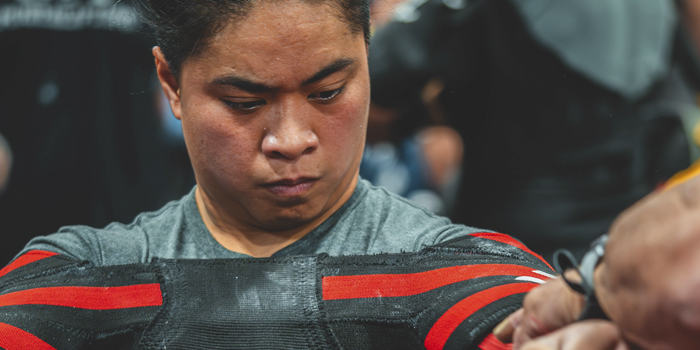
Entering powerlifting is an exciting journey towards strength and personal development. However, like any sport, powerlifting comes with its fair share of challenges and potential mistakes. In this article, we will explore some common mistakes that many powerlifters make in their years spent as competitors, and provide advice on how to avoid them. By learning from the experiences of others, aspiring powerlifters can set themselves up for long-term success in this demanding sport.
One of the most beloved books in the personal development space is “The Seven Habits of Highly Effective People” by Steven R. Covey. Our habits dictate our mindset, character, work ethic, and most importantly our results. We can look at the inverse of that and see what habits we may have that also hold us back from long-term development. Let's get to our seven habits to avoid or change in order to succeed.
Habit 1: Neglecting or Misunderstanding Proper Technique
One of the most critical aspects of powerlifting is mastering the proper technique for the three main lifts: squat, bench press, and deadlift. Many powerlifters often make the mistake of focusing too much on their training loads without prioritizing technique development. Technical mastery takes significant time and skill practice, however, the trade-off is you can become significantly more efficient at expressing strength. If your technique is suboptimal, investing in coaching or mentorship to learn and enhance your technique is always worth the return on investment. This will lay a solid foundation for success in the long run.
Habit 2: Overtraining
Another common mistake among novice to intermediate powerlifters is overtraining. Many beginners are eager to progress rapidly, leading them to push beyond their body's limits too soon. It is crucial to understand that progress in powerlifting takes time and patience. Rest and recovery are just as important as training itself since muscle growth and strength gains occur during periods of rest. Implementing structured rest days and deload weeks or days into your training program will help prevent burnout and reduce the risk of overuse injuries.
Habit 3: Poorly Designed Programming
A poorly designed training program can hinder progress and discourage athletes from continuing their powerlifting journey. Many new powerlifters make the mistake of trying to design their own training programs without having a solid understanding of programming principles. Following a reputable and proven powerlifting program, tailored to individual needs and goals, is essential for consistent progress. Always consider factors such as volume, intensity, frequency, and exercise selection that will ensure a well-designed and periodized approach to training.
Habit 4: Ignoring Assistance Exercises
While squats, bench presses, and deadlifts are the core lifts in powerlifting, it is critical not to neglect assistance exercises. Accessory exercises play a crucial role in addressing muscular imbalances, improving weak points, and building overall strength. Focus on exercises that target specific muscle groups used during the main lifts, such as single leg/unilateral movements, isolation movements for smaller intrinsic muscles such as rotator cuff work, and compound lifts that build the back, arms, and legs. Integrating these exercises into your training regimen will help strengthen supporting muscles, prevent imbalances, and boost performance in the main lifts.
Recent: Live Your Outcome, Not Your Goal
Habit 5: Poor Nutrition and Recovery Strategies
Powerlifting heavily relies on strength, and nutrition plays a vital role in optimizing performance and recovery. Many beginners make the mistake of not paying enough attention to their nutritional needs, and failing to consume enough protein, carbs, and healthy fats. Adequate hydration and micronutrient intake are also crucial for optimal performance. Additionally, sleep and rest play a significant role in recovery. Aim for seven to nine hours of quality sleep each night and consider implementing relaxation techniques, such as meditation or journaling, to aid in recovery and prevent burnout.
Habit 6: Comparing Progress to Others:
In the age of social media, it is easy to fall into the trap of comparing one's progress to others. Every athlete progresses at different rates, and everyone has their unique strengths and weaknesses. Remember that the only person you should be competing against is yourself. Focus on your goals, celebrate your personal achievements, and work to exceed your previous bests rather than comparing yourself to others. Consistency and dedication to your own journey will yield the best results. As they say, “Comparison is the thief of joy”.
Habit 7: Overemphasis on Maxing Out
The allure of getting likes on social media for the newer powerlifter can be enticing, but many powerlifters make the mistake of attempting max lifts too frequently. This is very much a long-term and patient game. Learning to stay the course, trust the process, and follow the plan seems to be the hardest part for many lifters to grasp. Constantly pushing to the limits can be mentally and physically draining and increases the likelihood of burnout. There is a time and a place for a true 1 Rep Max and it is the platform; where your PRs actually count!
Final Thoughts
Now that we have an understanding of the habits that may potentially hold back your overall progress, we can begin to manage them as well as improve upon them. Much like everything else replacing bad habits with better ones takes time. The rewards, though, are always worth the extra effort and patience.
Trevor Jaffe has been a competitive strength athlete for over 18 years. He has received first place finishes in strongman, and weightlifting, and places his primary focus on powerlifting. With top lifts of a 683 pound squat and an 815 pound deadlift, he has totaled International Elite in three weight classes (181, 198, and 220). Trevor currently has coached over 27 all-time world records with 8 separate athletes - Dallas Norris, Jenn Rotsinger, Ashley Garcia, Phil Herndon, Jordan Wong, Stacy “Bama” Burr, Danny Misencik, and as an ATWR holder himself. At the time, Stacy had set the highest-ever Wilks score for powerlifting across both male and female athletes, as well as federation, world, national, and state records.
Trevor currently holds the masters ATWR total for 181 and deadlift, the 198 and 220 class ATWR deadlift as well. Affectionately known as "the deadlift whisperer" for his ability to improve this specific lift, Trevor is also known for his ability to improve a lifter’s mechanics and technique leading to larger totals in a short time frame and significantly prolonging an athlete's competitive career. Trevor is also the host of “Conversations with Coaches” a weekly interview series with coaches across various strength fields.
trevorjaffe@gmail.com










